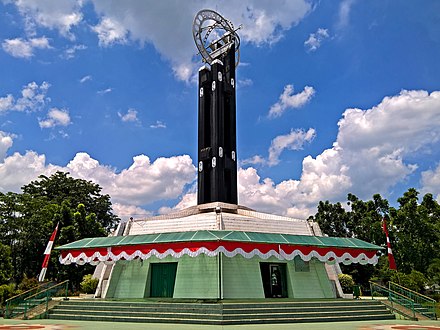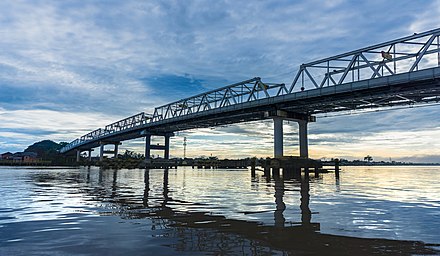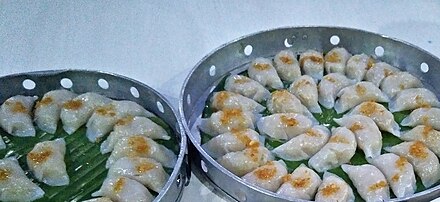Pontianak - city and capital of West Kalimantan Province, Indonesia
Pontianak is the capital of the Indonesia province of West Kalimantan, on the island of Borneo, and bisected by the Equator. The city is mostly populated by ethnic Chinese, Dayaks and Malays, as well as significant numbers of minorities such as Bugis and Javanese.
Understand
History
The word pontianak — probably from bunting anak, "pregnant with child" — means the undead vampire of a woman who died while during childbirth. Disguised as a beautiful woman, the pontianak goes around murdering unwary men in cold blood without showing any remorse, harming pregnant woman and eating babies, but she can be controlled by plunging a nail into a hole in the back of her neck. The modern Indonesian name for this type of ghost is kuntilanak, while it is referred to by the original word pontianak in Malaysia, Brunei and Singapore.
According to legend, when Abdurrahman Alqadrie's group arrived in the uninhabited area of Pontianak, it was haunted by pontianaks/kuntilanaks, which deterred many of his companions with their scary voices at night. To sweep these ghosts away, Alqadrie ordered his men to fire their cannons to the forest which was believed to be their base. Afterwards, no more pontianak's voice was ever heard.
In 1771, Abdurrahman Alqadrie cut down the forest which was at the crossing between the Kapuas and Landak rivers, then settled there. He was awarded the title Sultan. Under his leadership, he succeeded in attracting many traders, most of them ethnic Malays, and some Dayaks from the upstream parts of the Kapuas River.
In the early part of the 19th century, the Dutch occupied Pontianak and the rest of West Kalimantan's cities as part of its colonial campaign. Pontianak was occupied to become a trading post in order to gain rich natural resources, mainly rubber and wood, from the upstream reaches of the Kapuas River. Resistance by Malays and Dayaks continued sporadically and this forced the Dutch colonial armed forces to frequently request reinforcements from Batavia/Jakarta.
Due to war and widespread poverty in China at the end of the 19th century, many Chinese migrated to Indonesia, and some settled in Pontianak due to its strategic location for trading. This later added Chinese culture to the history of Pontianak. Chinese in Pontianak are mainly of Teochew, Hakka, and Cantonese descent.
The Dutch occupation ended in 1941 during World War II, when Japanese Imperial forces overran Dutch bases from the north. These bases were not able to deploy sufficient numbers of soldiers in order to defend the strategic island of Java. During the Japanese occupation, tens of thousands of civilians and intellectuals were massacred, mainly those who refused to recognize the emperor of Japan.
When the Japanese retreated, the Dutch under the Allied Forces umbrella re-entered West Kalimantan. Their colonial government over Pontianak ended a few years later after a series of diplomatic missions and local resistance which also freed the other Indonesian territories at the same time.
People
You may find that Pontianakians of each ethnicity tend to live homogeneously. For example, areas along Jalan Gajahmada are overwhelmingly Chinese whereas Sungai Jawi in the suburb are settled mostly by ethnic Malays. Intermarriage is not common, especially between ethnic Chinese and the indigenous people (Dayaks, Malays, Javanese, Madurese, etc.) But that's not to say these people like to fight against each other. Visit a restaurant somewhere in the middle of Pontianak and you might find both Chinese and Dayaks chatting hilariously with each other.
The locals of Pontianakians are mostly easygoing, at least compared to those of other metropolitan cities such as Jakarta and Surabaya. Their tone of speaking may not as soft as the Jogjanese, but if you try to blend yourself with them you will almost definitely be reciprocated.
Talk
Nearly all Pontians, regardless of ethnicity, speak Indonesian, although it is slightly mixed with a Malay accent close to that of neighbouring Malaysia. Most ethnic Chinese people at the southern bank of the Kapuas River speak Teochew, and those at the northern bank speak mostly Hakka (called Khek by locals). Mandarin is spoken mostly by those aged 30 years old or above, but don't be surprised if they mix it with Hakka or Teochew dialect as it is not very commonly spoken in town. English is mostly spoken by the young locals, but is usually not mastered beyond some basic knowledge despite many English courses, so it would make your trip much smoother if you learn some basic Indonesian before you go. Hiring an English-speaking guide could smooth your travel a lot.
Get in
By bus
Bus trip to Pontianak can be arranged from Kuching in neighboring Malaysia. A trip from Kuching to Pontianak or vice versa will last at least 8 hours which will pass the border area of Entikong. Some of the bus providers serving this route are Damri, SJS and Biaramas Express (www.mybus.com.my). The fares for the trip ranges from RM45 to RM75. Click Pontianak to Kuching for travel itinerary on this route. A bus trip to Brunei is also available. There is also a bus available from Pangkalan Bun. It takes around 14 hours and costs ~450,000 (2018/01).
By plane
- Supadio Airport (IATA: PNK), -0.150556°, 109.403889°. There are very frequent flights from Jakarta's Soekarno-Hatta International Airport operated by all major Indonesian airlines. In addition, there are flights from many other major Indonesian cities, including Bandung, Yogyakarta, Surabaya, Medan, and Batam, and the larger cities of Kalimantan such as Banjarmasin. XpressAir operates international flights to Kuching, and AirAsia to Kuala Lumpur.
To get to or from the airport, DAMRI runs hourly bus service to the city centre for IDR35,000. The easiest spot to catch the bus in the city is at the DAMRI office at Jl. Pahlawan 232, Pontianak (phone +62 561 744859). For taxis, coupons at a fixed price of Rp70,000 are sold.
There are Damri Bus from Supadio Airport to Singkawang and Sambas for Rp 100,000/person.
By boat
There is a fortnightly service by the Pelni ship KM Lawit from Jakarta to Pontianak. The same ferry then continues to Semarang, Java. Travel time from Jakarta is approximately 44 hours, with only economic class sleeping arrangements. Other passengers are local people, perfectly friendly and including many families. Cost is around IDR260,000. This remains the cheapest means of inter-island transportation.
By car
Pontianak can be reached by car from Kuching in 6-8 hours, although the road is not in very good shape. See Pontianak to Kuching for a detailed itinerary.
Get around
The most convenient way to explore Pontianak is either by taxi or rented car. The entire Pontianak is integrated by road link, parts of which are not well maintained. There are also plenty of cheap (Rp2,000) public buses but sometimes it can be kind of adventure to use them since the buses are not well marked, drivers and most of the locals do not speak English and the orientation is difficult. Also there are boats crossing the river and this is in general the most convenient and the cheapest (Rp1,000) way to get in to the other side.
See


- Kebun Binatang Pontianak (Pontianak Zoo), Jl. Adi Sucipto. A reconditioned zoo with a reasonable variety of animals from the jungles of Borneo and from some parts of Indonesia. Some of the collection, including some orangutans, were said to had been freed from illegal ownership by an Italian lumber mill owner. 2020-05-06
- Tugu Khatulistiwa (Equatorial Obelisk), 0.00098°, 109.32217°. It is built directly under the 0 degrees equator line. It is 11 km from the city centre and is comparably easily and quickly reachable by public buses (Rp2,000). There you can learn lots of interesting facts about the equator and to see how unique is Pontianak, one of the few cities in the world situated exactly on the equator line. There are friendly English-speaking staff and a souvenir shop, actually maybe the only one in Pontianak. 2020-05-06
- Kalimantan Barat Museum, Jl. Jendral Ahmad Yani, Pontianak, Kalimantan Barat, -0.048438°, 109.342813°. This museum is made of concrete, with concrete reliefs depicting the lifestyle of the two well-known West Kalimantan ethnicities Malay and Dayak. 2022-09-30
- Masjid Jami' Pontianak (Masjid Sultan Syarif Abdurrahman), -0.026937°, 109.347313°. The oldest mosque in Pontianak. This mosque is one of two buildings that marked the founding of Pontianak City in 1771 AD, besides the Kadriyah Palace. 2022-11-13
- Kadriyah Palace (Keraton Kadriyah), Jl. Tj. Raya 1, Dalam Bugis, Pontianak Timur, -0.028813°, 109.349812°. 10:00-17:00. The palace of the Pontianak Sultanate which was built from 1771 to 1778 AD. 2022-11-13
Do
- Sungai Kapuas (Kapuas River) divides Pontianak into two different sides. Get a boat ride along the river about five or six o'clock local time and you will see amazing views along this river. The locals who live along this river taking a bath in this river during these hours throughout the year. A unique tradition that should not be missed.

- During the end of the Muslim fasting month of Ramadan, there is a Meriam Karbit festival that is well worth visiting.
Buy
Equatorial souvenirs from the Equatorial Obelisk souvenir shop, as well as, cheap textile and many craftwork items as everywhere in Indonesia.
Eat
Pontianak is quite popular among domestic tourists due to its wide range of food with strong cultural touch, most notably the Chinese. There are plenty of eating options for culinary adventurers, from street hawker food to local restaurant culinary to internationally franchised fast food.
- Street hawker food, where you can taste the local delicacy such as Beef Rice Noodle & Beehoon (fried, with soup, dried), Seafood Noodle (with soup & dried), Nasi Goreng (fried rice with chicken, beef), Nasi Uduk, Kwe Kia Theng (Teochew phrase, rice noodle in soya sauce soup with pork and intestines (optional), Bakso (fish or beef ball soup), Sate (chicken or beef satay), Kari Peng (Teochew phrase meaning curry rice), Koi Peng (Teochew phrase literary "chicken rice", but content also include pork, cucumber, etc. also known as "Nasi Campur" or mixed rice), Martabak, Kue Terang Bulan, Otak-otak, Pempek, Tui Jiu He (Teochew phrase literary "beaten cuttlefish", dried cuttlefish are beaten until tender and flossy, woodfired until cooked, then served with belacan sauce, best to have it with friends and beer), Sio Bi (also known as Siomay, made of pork served in soya sauce with the options of chilli and mustard), Siomay Bandung (fish cake, beancurd, potato, vegetable, egg served in peanut sauce, with the option of chilli and tomato), He Mue/Bubur Ikan (fish porridge), and many more. These street hawkers are usually found from dusk until 10PM - midnight, depending or business, but some operated from dawn to dusk or midnight. They are usually clustered around busy commercial streets such as the CBD: Jalan (Jl.) Gajahmada, Jl. Hijas, Jl. Setia Budi, Jl. Agus Salim, Jl. Diponegoro, Jl. Patimura, Jl. Nusa Indah 1, Jl. Tanjung Pura, Jl Siam or around the suburban such as Jawi (Jl. Merdeka, Jl. Hassanudin, Jl. Wahid Hasyim), Kotabaru (Jl. St. Abdurrahman), Purnama, Siantan, Sungai Raya Dalam and Sungai Raya. The pricee per meal ranges from Rp5,000 to about Rp25,000.
- Bakmi Kepiting Ek Meng, Benua Melayu Darat, South Pontianak, -0.032813°, 109.337063°, +62 857 872 07041. 09:00-16:00. Try the local noodle dish of Pontianak, mie kepiting. 2022-11-17
- Bubur Ikan Ahian, Jl. WR Supratman No.A3/27, Benua Melayu Darat, -0.032787°, 109.336953°, +62 561 730908. 06:00-14:00. Serves bubur ikan (rice porridge with fish soup). 2022-11-17
- Dangau, Jl. Arteri Supadio. Malay cuisine

- Gleam Cafe, Jl. Tamar No.3, Tengah, -0.023187°, 109.336562°, +62 813 480 66060. 10:00-22:00. Try local Pontianak dumplings called choi pan or chai kue. 2022-11-17
- Italian Steak House, Jl. Nusa Indah 3.
- Papyrus Restaurant at Gardenia Resort and Spa, Jl. A Yani (5 minutes from the airport). offers all-day dining with a selection of Asian, Western, and authentic Indonesian favourites. At open deck area, you can enjoy the views of the landscaped gardens while enjoying the chef's specialities.
- Restoran Gajahmada, Jl. Gajahmada. Pontianak cuisine
- Restoran Hawaii, Jl. Nusa Indah 3. Pontianak cuisine
- Restoran Star, Jl. Gajahmada. Pontianak cuisine.
- Sari Bento at Museum, Jl. Ahmad Yani. Japanese food
- Satria Wangi Dining, Jl. Nusa Indah II No. 62. They have great local menu at very affordable price and average-English-speaking staff. The restaurant is centrally located. Its signature dishes such Ikan Gurame Terbang, Gulai Kepala Ikan, Ikan Jelawat Kukus, and have been featured and reviewed by many national TVs cooking show.
- Sotong Pangling Pangkong & Digiling, Jl. Merdeka Barat No.577, -0.024188°, 109.329562°, +62 812 544 98460. Serves sotong pangkong, one of Pontianak's specialty dishes, grilled dried cuttlefish with special sambal. 2023-01-09
Drink
Try a local Pontianak drink made from aloe vera called es lidah buaya.
- Kedai Sajadah Mualaf, Sungai Jawi Luar, Pontianak Barat, -0.014438°, 109.321938°. M-Sa, 09:00-16:00. Serves es lidah buaya. 2022-11-13
Sleep
If you arrive by Pelni ferry late at night then it's better option to sleep aboard until morning as there is usually a long layover at Pontianak.
Budget
- Hotel Wisma Kartika Putri, Jl. Jenderal Ahmad Yani No.30. No air, no fan, no window and fairly mosquito-ridden with no insect spray available. Rp70,000
Mid-range
- Hotel Sentral, Jl H.O.S. Cokroaminoto no 232 (Ten minutes walk from drop off point for most Kuching buses, turn right at traffic light.), +62 561 744910. Check-in: 2PM, check-out: noon. Faded rooms. Staff friendly enough. All have AC and attached bathrooms. On a busy junction between two streets so window rooms will be slightly noisy, (but non window rooms are a bit musty). Travellers have reported overpricing and demands for security deposit from the staff here From Rp160,000
Splurge
- Gardenia Resort and Spa, Jl. A Yani II.
- Hotel Sentral, Jl. H.O.S. Cokroaminoto 232. Commercial Hotel
- Hotel Gajahmada, Jl. Gajahmada.
- Hotel Grand Mahkota.
- Hotel Peony, Jl. Gajahmada.
- Hotel Kapuas Palace, Jl. Imam Bonjol.
- Hotel Kini, Jl. Nusa Indah 3. Double from Rp400,000
- Hotel Mercure, Jl. A. Yani.
- Hotel Orchardz, Jl. Gajahmada.
- Hotel Santika, Jl. Diponegoro. National Chain Hotel
- Star Hotel, Jl. Gajah Mada 189.
Stay safe
Pickpockets and motorcycle thefts are quite common in town. Exercise necessary caution even when being in a shopping mall. Be careful when travelling in a public bus (called oplet) as somebody could threaten you with a knife to hand over your valuables. (This safety note is from March 2009 and might be outdated)
Connect
Phone call
Most national GSM and CDMA operators have their signal towers spread throughout the entirety of Pontianak, meaning that there should not be too many problems communicating around the town and the tariffs are also reasonable, at least for tourists coming from the West. Shops selling SIM cards and their top-ups are also in abundance, even in the outskirts of town, just like in other cities in Indonesia. Fixed line phones are also available everywhere. There are also few phone stalls (Warung Telkom) offering you phone call with a reasonable fare.
Internet access
Internet cafe businesses are flourishing, but you'll only find a few without distracting gamers like you might find in typical East Asian internet cafes. Don't worry about the billing (that's how the locals say). An hour of internet access will cost you Rp3,000-6,000. But don't expect a speed-of-light one out of it, though. Many locals have internet access varying from snaily dial-up to ISDN (most notably Telkom Speedy) installed in their houses. GPRS and 3G access from your cellphone exists, but you will not necessarily find GPRS signal everywhere even in the middle of the city.
Consulates
- 🇲🇾 Malaysia Consulate, Jl. Sutan Syahrir No. 21, +62 561 732 986.
Go next
Pontianak is the gateway for travellers wishing to travel deeper inland. Singkawang, another one of the most Chinese-influenced town is reachable by taxi. Kuching, which lies in the Malaysian part of the island, offers some modernity you wouldn't find in the Indonesian part.
If you want to explore the rest of Kalimantan there is a bus heading East to Pangkalan Bun which leaves the Interstate Bus Station at 07:00, costing around Rp 450,000 as of 2018. It is however a long journey, expect arrival in the late evening in Pangkalan Bun.
Pontianak
pontianakkota.go.idKota Pontianak
2nd-order administrative division
West Kalimantan
Primary administrative division